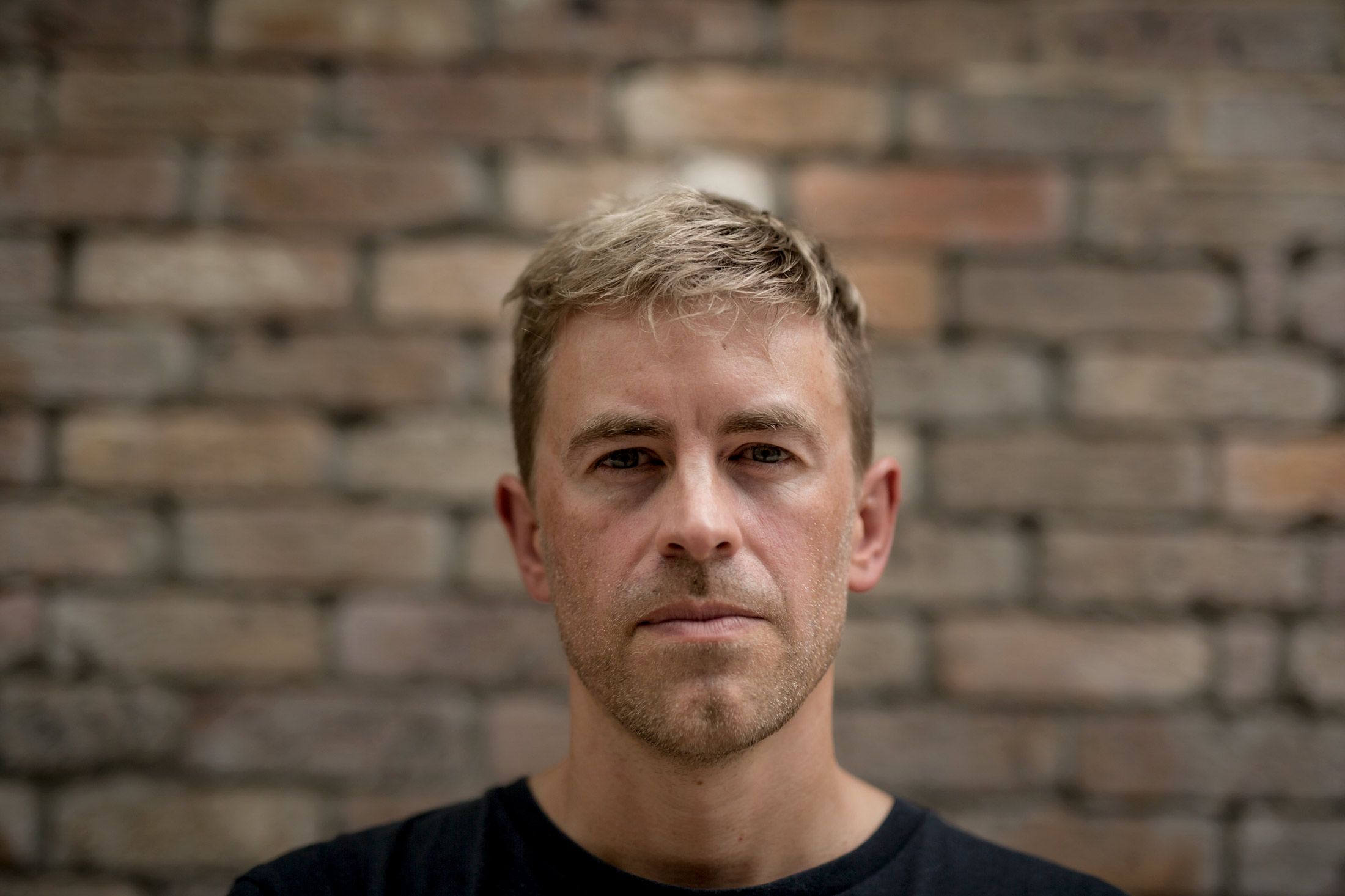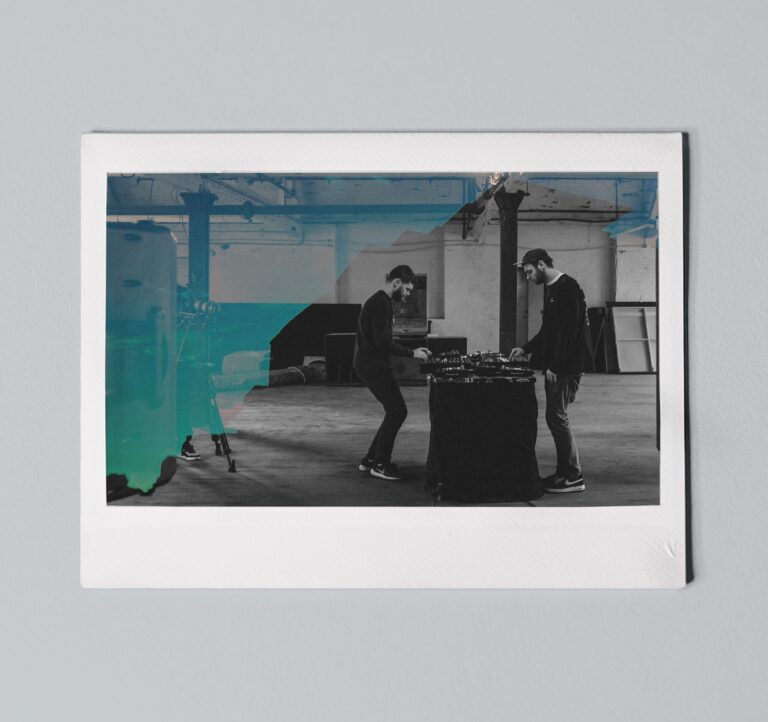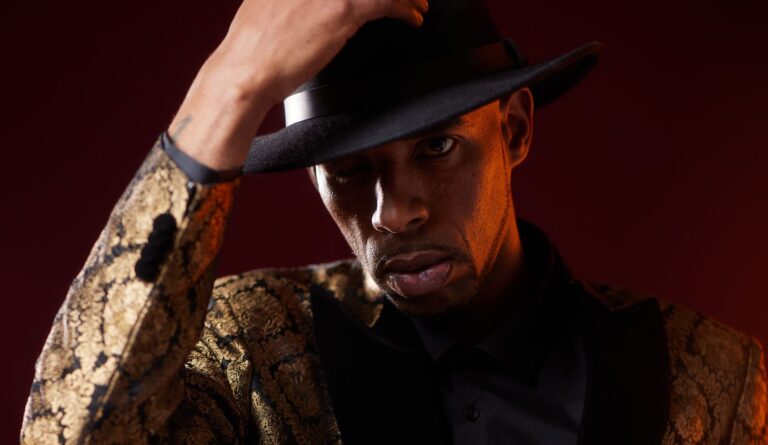With longstanding runs on Hospital Records and the now defunct Med School, Royalston is renowned and recognised internationally. Even by gamers, as his bone-crushing Blight Mamba track on the soundtrack of Need for Speed proved some years ago. Drawing inspirations from numerous genres, among them techno, his creative gist stretches far, pushing the boundaries of the breakbeat genre; going against the grain of too easily digestible dancefloor music.
Thanks to a background in writing soundtracks for movies, series and commercials, Royalston’s versatile take is spot-on in evoking imaginative scenes. And with experience that spans over 30 years in the audio-visual arts, he’s clearly no stranger to continuous learning.
As of late, the Sydney based drum & bass producer also expanded his repertoire with teaching mixing, mastering, and sound-design – in essence passing on the knowledge to the next generation. His fourth album arrived last year – The Midnight Zone – a self-release and the start of his own label of the same name.
So what’s cooking currently? Where’s it all heading for the Sydney-based artist – and what about that fifth album? What’s more: what wisdom can he share through reflecting on his work as a teacher? Over to one of the genuinely nicest guys in the drum ‘n bass scene. Let’s shine a light on Royalston’s legacy.
How are you doing?
I’m good!
We see you’re also a teacher these days. How did this come about?
It was good timing really, I started about a year before the pandemic at a place called Liveschool, in Sydney. Liveschool focuses on Ableton, but the classes teach everything about music creation for beginners to experienced students. I got asked to teach mastering and I thought it would be just one or two classes. But I got into it more and started teaching mixing as well. Now I also teach sound-design and music theory, so it’s quite good. I’ve met a lots of cool, talented students. A lot of teachers there are quite respected and big in their own genres. There are a couple of techno guys, pop-producers, lots of different styles – they are talented bunch and it’s great to be exposed to different music from them.
I like it though it can be hard at times. Some classes, they (the students) don’t always respond the way you expect. Some people are just starting to learn this stuff, some are really experienced. But it’s also pretty rewarding.
Does it motivate you, after a couple of classes, to go back to the studio?
Definitely. It can be exhausting, but when I’ve recovered, then it’s good. I can combine it with going to the studio. The studio at the school is really nice too. It’s cool to just even take photo’s there, it’s really fancy (laughs). I can check my mixes there.
So you have a place away from home to work on your music – like another compartment?
Yeah, just to separate yourself. That’s really an important thing to mixing – to hear your music in a different space. If it doesn’t sound right in the other space, you probably need to work on the mix again. It’s easy to get your own mixes sounding good in your own space. But the trick is when they have to translate somewhere else. That’s harder.
I remember going through this book about mastering and mixing. The guy said: if you put on the vacuum-cleaner and it still sounds good, you’re on your way.
That’s a good one actually. I will use that! There’s a similar one I use: go outside the room and shut the door to the studio. Then go down the hall and play the mix. If it still sounds like your song down the hall and nothing sounds weird – that’s a good indicator as well.
You mentioned the challenge of keeping everyone’s attention. Is that the big one?
Yes. Some people, when you’re teaching at night, they have been at work all day. Say we’re teaching mastering, it’s pretty technical. There’s a lot of numbers involved and a lot of really detailed stuff. Some people – that would keep them away. Others might not be quite ready for mastering yet. They just have only just started learning about mastering. While some, on the other hand, are ready to master their own tunes.
So what do you like the most about taking on this role?
The students, really. When you have good students, excited to learn stuff, that’s pretty satisfying. Also getting to hear and working on really cool music. Stuff like trap and hip-hop, which I done in the past, but would not get to do much normally.
Is it also about keeping up with the new trends in sound design?
That’s another good thing. Most of the students are roughly 20 years-old and are right in the music-scene. Most are DJ’s. It’s very varied. I hear all these weird names and new sub-genres. And it’s great to seed lots of people being into drum ‘n bass as well.
What are the reoccurring themes in terms of mindset that students especially seem to struggle with?
A lot of students expect things to happen quicker but it just takes time to learn. There’s always the story/ urban myth of a guy who’s been doing it for a year and then signed with this massive label. That’s what many people compare themselves with. Music is a long journey – very long and slow for me. It took me years to get anything released.
You want to get better at what you’re aiming at. But impatience is really hard to overcome – in myself too! And you don’t know you’re improving improving, but you actually are.
So it’s also a matter of comparing one self too much with others?
Yeah! And another thing: people overthink it and become obsessed with the technical side. Having a good song underneath all the production – that’s really the most important thing. Having some good music in there and then producing it up nicely, rather than the other way around. Or forgetting there’s a song underneath.
Zooming in too much, so to speak.
Definitely.
You also have a background in visual design – are you still active doing that?
Yeah, I am. I was an illustrator for many years and I still do it, though it’s not my main focus most of the time. I do the covers myself and still do designing as a job sometimes (such as video clips for various Hospital records artists). I still try and draw regularly too. That’s actually proving the hardest thing about the new label: I have the tracks done but the art is holding up the releases. For my next releases I’m going to do photographic covers taken by a friend who is a photographer…. Then I can distance myself from it a bit and get more music out.
Have you always done the artwork for your music yourself?
Yes. Even when I was on Med School and Hospital. Not so much Hospital, but any Med School-releases, albums, I’ve always done the artwork (except Cerulean Blue which was done by Ricky Trikart).
Seems that creativity does not thrive in a vacuum, but rather does so through various inputs. How do you relate to this in terms of setting your environment up for the best possible outcome?
Having my studio is important. Being able to isolate yourself a bit… I think that statement is very true. I got a lot of family stuff, like a five year-old. And that definitely impacts the amount of brainpower you can give to your creative stuff. I still try to do some drawing every week. Otherwise I will forget, with so many things trying to grab my attention. I am still learning about doing my own label – there are so many things still to figure out too.
Would you like to share something about it?
Yes. My next two tracks are coming out as singles. And I am deciding whether I package these up as another album or as an EP. I am also considering releasing another EP by somebody else. I did not plan on that, but one of my students has some really cool stuff. It may not even be drum & bass, but it is really connected to d&b. It feels like it would be good music on any label. We’re working that out at the moment and doing the mastering.
The idea of of immersion on the other hand. How important do you think it is? To make it stick more on a subconscious level so to speak.
I think it’s important and do do it every day pretty much. Like, I have one day off from the studio each week. And I don’t always get as much time there. If I was to choose, I would probably live there. But I do notice it’s really good to take a weekend off sometimes. To get that distance and evaluate.
There haven’t been any DJ-gigs in Sydney during the pandemic. These used to break it up a bit. I usually get ready for a gig a day or two, just thinking about DJ’ing for a while. And that can change your perspective on your music. When I don’t have any DJ-gigs, my music gets weirder and weirder. Less suitable for the dancefloor, becoming quieter and introspective. After some gigs I come back and think: that will never work, what was I thinking? (laughs).
So do you still share your music with others for feedback?
I do share my music occasionally. It depends. Actually less and less, because I think you have to learn to trust yourself. And if you need someone else to tell you that it’s right, then maybe it’s not. There’s this thing with design. Like when a designer has something really cool, but they have to send it to a client. And then the client sends it to their boss, and then these people send it to theirs – and they all get their say. It becomes watered down. Someone says: do this color differently, and then someone says: make this bigger. And it changes, becoming more and more generic.
Back to tunnel vision: I kind of like that isolation. It ends up with making more unique music, which is quite lacking these days. In a lot of genres there’s stuff sounding so similar. We tend to try and make things big, but maybe that’s the wrong attitude. Perhaps it’s better to make things stand out.
Regarding knowing when to step back from music when it doesn’t work out. Do you become more aware over time when to let go for a bit?
Absolutely. This is something I always talk to students about – and struggle with myself. Time is the only thing you can use to clear your head. When you forget a song, you can listen to it like it wasn’t yours. You can hear it fresh and notice what’s wrong with it straight away. But if you’ve heard it 800 times in your studio that day, it’s going to be very hard to assess whether it’s working. You’ve lost all the perspective.
Let’s talk about your last album – The Midnight Zone. How do you reflect on it in hindsight? How do these insights help when looking ahead at the next album?
This one took a long time to come out and in hindsight I’m still happy with it. Like, I am happy with a lot of the older tracks on there (one is from 2001!). But sometimes you look back at certain tracks and think: I don’t really like that one anymore. I don’t regret putting them out, but I am learning it’s quite different when releasing by yourself, rather than on a label. When you’re doing it for a label, you want to write good music, but you’re still, at some stage, trying to convince someone to sign it. When when doing it yourself, you’ve got to make up your mind and actually believe in a song to put it out. No one is going to say ‘no’…which is somehow harder for me because I have no one to say “this is release worthy” – I have to believe in it myself.
With the fourth album, I had enough time to go over all the tracks and there were a few songs that got cut. I was planning to make it a two-part album, so I am not sure yet if the next one coming out will be the second half or just a new album. People liked the first part though and I do have enough songs to do it (make a second half).
How far are you in that process?
I am trying to finish tracks quicker. Possibly I am half way there, but I could be wrong. I usually underestimate how long it will take. I am still going through stuff I had for Med School. There was a long period, when no one there listened to the music we were submitting, so I am going through it and deciding what I still like. If it’s good, I try to quickly finish it. Like all these half-finished songs are waiting and I want to get rid of them, let them go.
Surely there are hidden gems there.
Yeah, there are a couple. Another thing I’m always telling students is: even if you’re not happy with a track, after working on a session, export a version and put it in a folder. When you find it some days/ months/years later, you might have ten versions of this song sitting on your computer. I end up listening to these versions and saying: ‘version three or one was really cool and I got lost somewhere in the process… I made it a worse song, that’s why I gave up on it’. It’s much easier to have these MP3’s that pop-up at random in your library, rather than opening up old projects that might have lost audio files or something, and work out if something is worth finishing.
I found so many tracks, I had to use a spreadsheet. They are spread across five hard-drives. Some even go back as far as 2005. Maybe I did not have the skills to finish these good songs at the time, but now it’s super easy. Just keeping that original vibe might provide for a good song.
Talking about the next album: is there a certain feel or vibe you would like to portray?
Well, I am still not sure if it should be an album. I’ve got this collection of weird tracks, almost like IDM (intelligent dance music). I am wondering if they would be good on an album. Or a cool EP by themselves. It’s reminiscent of some stuff I did for Med School – the weirder music – not really for the dancefloor, but maybe playable there. It’s produced well enough, but harder to dance to. There’s not much music like that coming out right now as far as I am aware. It could be fun to go back there. The album, if it would become the next part of The Midnight Zone, would be similar in terms of covering a lot of spectra. What’s in my bag of songs is pretty varied still, there’s no single style emerging.
And in terms of the visual side?
That’s the only thing holding me back currently. The visual part usually is very easy to me. But I have been in the music-zone so much lately, I will have to go to the tracks and see what they tell me. Otherwise I will have to get my son to draw something for me, that would be very handy (laughs).
So does he like music too?
He does, he’s quite into music. I haven’t even encouraged it in any way, but he really loves Dead Limit – it’s his favourite song. I put it on once, while he was in the backseat of the car. He was jumping around and loves it. Anything with a lot of energy he really likes.


